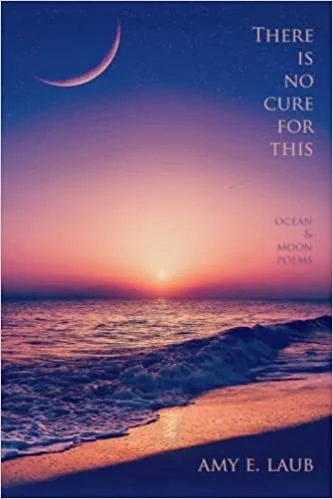There Is No Cure for This: Ocean & Moon Poems
Independently published
$11.95
You can purchase a copy here.
Reviewed by Abbey J. Porter
Amy Laub’s most recent collection, There Is No Cure for This: Ocean & Moon Poems, is aptly named. I get the feeling that the writer is indeed gripped at the core by a force that won’t let go.
The book is divided into two parts: “Ocean Poems” and “Moon Poems.” I’ll confess, I am not the biggest fan of “nature poetry.” On top of that, I was skeptical of an entire 68-page book focusing, in theory, on two subjects. But as I dove into the collection, my doubts were swept out with the tide.
Laub’s nimble, many-faceted perspective engages the reader and keeps the poems from becoming repetitive. The poet demonstrates a deep appreciation for and fascination with her subjects, and an agile imagination in characterizing them. The sea is “a salt blanket,” “a mother’s blanket of water,” “the lumberjack ocean.” Likewise, the moon is “an aspirin,” “a hole into heaven,” “a motorcycle headlight.”
In her opening poem, “There Is No Cure for This,” Laub describes a certain inevitability in nature:
There is no cure
for pebbles and bits of shell
stranded at low tide,
no way to change how they clink
and whisper when the surf returns.
Her gratitude for these processes is clear—particularly in the poem’s last line, “Thank God there is no cure for this.”
But Laub’s connection to the water extends far beyond mere appreciation. In “Into the Water,” my favorite of the collection, she describes entering the ocean:
I exhale the last from my lungs,
oxygen seeps in from brand new gills…
My body steers itself
with translucent fins;
it has always known how to do this
The poem suggests a longing on the narrator’s part to join the underwater world—and an innate ability to do so.
That longing resurfaces in “I am Walking into the Waves,” in which she says,
The odds of survival
among the claws and jaws
and teeth of the deep
are far richer than on dry land
among poisonous bipeds.
She juxtaposes the watery world with that inhabited by people. Even the dangers of the ocean do not compare to those posed by humans, and while the “claws and jaws…of the deep” seem a part of nature, “poison” in this context suggests a perhaps-unnatural toxicity.
Indeed, in “On a Beach,” Laub describes settling down to live “among the rocks” and becoming part of the ocean’s cycle. After embodying various creatures and other sea elements and even being consumed as part of the ocean’s natural processes, she concludes with:
I am a pearl, pried out of my shell,
hanging on a string between two others
around some lady’s neck.
This ending—to be relegated to such an unnatural state—seems a true, sad death.
Throughout the book, Laub writes in plain, straightforward language—no “50-cent words” here. Yet she can be fanciful and creative with that language, as in, “moon twinks a trillion tossing bits.”
In describing the moon, Laub seems to try on different possibilities regarding the celestial body’s role and stance relative to people. One such possibility is of the moon as guardian and comforter. In “Going to the Moon,”
she lifts me,
settles me on her hip,
wraps one arm around
But while Part II of the book is ostensibly dedicated to poems about the moon, the ocean creeps back in, refusing to be sequestered. In “What I Do When I Am Inland,” Laub writes,
I am moon slapped at the kitchen sink,
washing goblets and plates and knives,
while many miles east of here
the ocean scours her rocks.
Even when her body is far from the ocean, her mind is drawn there.
“Moon on Vacation” touches on the relationship between moon and sea:
The moon is tired. She wants a vacation.
She wants no more ocean to drag around,
immoderate train of a wedding gown
One gets the impression that the water is ultimately what grips the poet most strongly. Yet even for her, it maintains an element of mystery. In “The Ocean, that Old Flirt,” she says of the sea, “We prowl its ragged edges/ knowing almost nothing about it.”
She expresses a similar sentiment in “Moon Everywhere”:
The National Aeronautics
and Space Administration
knows absolutely nothing
about the moon.
These elements—ocean and moon—seem to be knowable by humans only through experience, imagination—and, perhaps, poetry.
Abbey J. Porter writes poetry and memoir about people, relationships, and life struggles. She holds an MFA in creative writing from Queens University of Charlotte, an MA in liberal studies from Villanova University, and a BA in English from Gettysburg College. Abbey works in communications and lives in Cheltenham, Pa., with her two dogs. You can visit her online at abbeyjportercomms.com.


